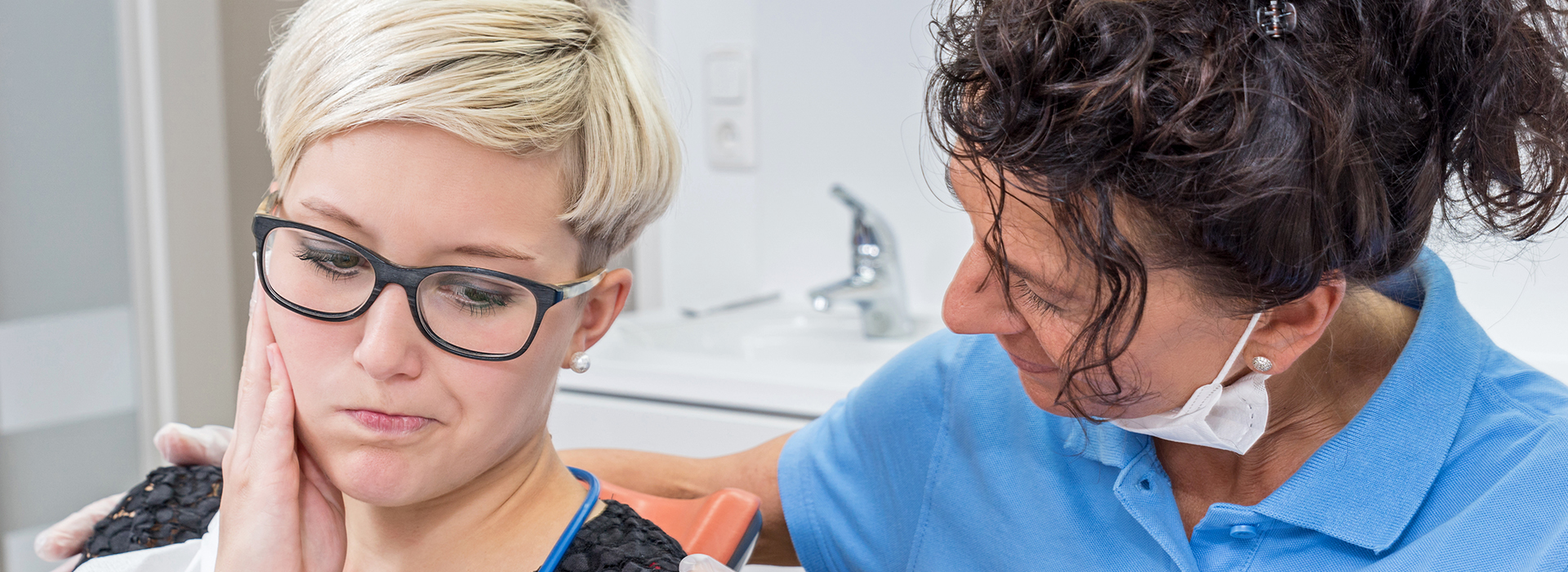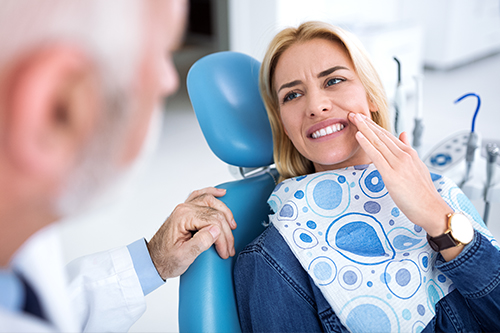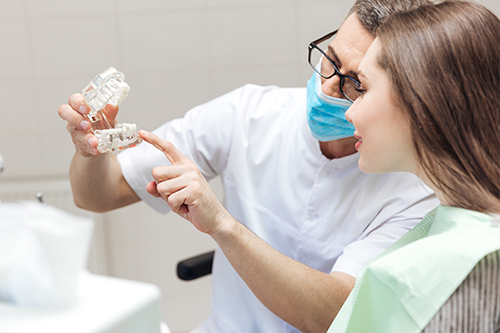
Dental emergencies range from sudden, intense pain to visible trauma that affects how you eat, speak, or breathe. Not every dental issue requires a trip to the emergency room, but certain signs — uncontrolled bleeding, severe swelling, avulsed (knocked-out) teeth, or pain that wakes you from sleep — indicate the need for prompt professional assessment. Recognizing those warning signs early can reduce the risk of further damage and help us preserve as much of your natural dentition as possible.
Many urgent dental situations begin as a seemingly minor complaint that worsens over hours or days. What starts as mild sensitivity after an injury can become a deep ache as inflammation spreads to the tooth’s nerve or surrounding tissues. Quick action allows a clinician to stabilize the situation, relieve pain, and limit the scope of treatment required later on. If you are unsure whether your symptom qualifies as an emergency, seek evaluation — timely examination is the safest course.
When you arrive for an emergency evaluation, the priority is to control pain and assess the risk to oral structures. That triage process guides immediate next steps and shapes a short-term plan to protect the tooth and surrounding tissues. Our goal in every urgent visit is to reduce discomfort quickly while gathering the information needed to recommend durable, evidence-based care.
Dental emergencies fall into a few broad categories: traumatic injuries (such as chipped, fractured, or knocked-out teeth), severe infections or abscesses, sudden loosening of a tooth or restoration, and problems related to wisdom teeth or failing dental work. Each category has its own clinical considerations and timelines for treatment, but all benefit from early intervention to minimize complications.
Typical issues we treat include toothaches that suggest deep decay or pulpal inflammation, fractured enamel or dentin after an accident, dislodged crowns or fillings that expose the tooth interior, and oral infections that cause swelling or fever. We also manage acute periodontal (gum) conditions and soft-tissue injuries. Proper diagnosis often requires clinical examination combined with digital radiography to determine the extent of injury or infection.
Below is a list of the specific urgent problems commonly seen in our office:
Emergency care begins with a focused history and clinical exam to identify the source of pain or dysfunction. The clinician will ask about the onset and character of symptoms, any recent injuries, and your medical history that could affect treatment choices. For many cases, a series of focused digital X-rays provides necessary detail about tooth roots, bone, and the presence of infection.
Pain control is addressed immediately using appropriate local measures. Depending on the situation, this may include targeted local anesthesia, temporary dressings, or antimicrobial rinses. If swelling or infection is present, short-term management often involves drainage or antibiotics when clinically indicated. These steps are intended to stabilize the condition so that definitive repair can be planned.
After stabilization, we discuss treatment options that range from conservative restorations to more extensive procedures. For example, a fractured tooth with a simple chip may require smoothing and bonding, while a deeper fracture involving the pulp could necessitate endodontic (root canal) therapy or, in some cases, extraction. The clinician will explain the rationale for each option and recommend the treatment that best preserves oral health and function.
Short-term measures are designed to halt symptoms and protect the tooth. For broken or lost restorations, placing a temporary filling or re-cementing a crown can shield sensitive tissues while a permanent plan is developed. For soft-tissue wounds, careful cleaning and suturing when needed promote predictable healing. When a tooth has been knocked out, re-implantation within a limited time frame can sometimes save the tooth; preserving the tooth in milk or an appropriate storage medium and seeking care quickly improves the chances of success.
Definitive care focuses on restoring form, function, and long-term health. For teeth with extensive structural loss, crowns or onlays rebuild shape and strength. When the tooth’s nerve has been compromised, endodontic therapy removes diseased tissue and allows the tooth to be retained as a functional part of the mouth. In the rare situations where a tooth cannot be saved, extraction is followed by tooth-replacement planning to maintain occlusion and prevent shifting of adjacent teeth.
Modern restorative options include precision crowns, implant-supported crowns, bridges, and removable prostheses. Each option carries clinical considerations such as the quality of the surrounding bone, adjacent teeth, and overall oral health. The treatment plan we recommend is tailored to the individual patient’s needs and the long-term goal of preserving or restoring a healthy, functional smile.
Follow-up care is a critical component of successful emergency treatment. After initial stabilization, scheduled visits allow us to verify healing, complete definitive restorations, and monitor for complications. For example, a tooth that received a temporary restoration after trauma should be reassessed and finished with a permanent crown if indicated, to protect it from future fractures.
Rehabilitative steps may also include orthodontic considerations if trauma has altered tooth position, or periodontal care when gum tissue has been affected. If a tooth was extracted, planning for replacement—whether with an implant, fixed bridge, or denture—helps maintain chewing efficiency and facial structure. Timely restorative work also reduces the risk of further decay or failure of adjacent teeth and restorations.
Preventive measures can reduce the likelihood of future emergencies: wearing a properly fitted mouthguard during sports, addressing clenching or grinding behaviors, and maintaining routine dental visits to catch problems before they become urgent. If you experience any new pain or unusual symptoms after emergency treatment, early communication with your dental team ensures swift management and a better outcome.
The office of Suss Dental Group provides structured urgent-care pathways designed to evaluate and treat dental emergencies efficiently. Our clinical team uses contemporary diagnostic tools and established protocols to prioritize patient safety and effective symptom relief. Rapid assessment, clear communication, and coordinated follow-up are central to how we manage urgent dental needs.
We work with patients to determine the most appropriate next steps following stabilization, drawing on restorative, endodontic, and surgical expertise as required. In situations that require collaboration, we coordinate care with specialists to ensure seamless progression from emergency management to definitive restoration. This multidisciplinary approach helps deliver consistent, evidence-based outcomes for complex cases.
If you are experiencing a dental emergency, don’t delay in seeking evaluation. Prompt attention improves the likelihood of preserving natural teeth and minimizes the risk of complications. Contact us to arrange an urgent assessment or to learn more about how our practice handles emergency dental care.
In need of more information or guidance after a dental injury or sudden oral pain? Please contact us for more information.


Pain is your body's way of signaling that something is not quite right and though there are many reasons for oral pain, one of the most common complaints and reasons for seeking urgent dental care is a toothache. Whether you simply need a dental filling, a crown, or require a root canal procedure to save your tooth, we'll alleviate your discomfort and restore the look and function of the involved tooth.

Dental trauma can result in a defect as minor as a small chip in tooth enamel to a more extensive and painful crack or fracture. With sufficient force, a tooth can even be displaced or completely knocked out of its socket. With prompt emergency care, many injured teeth can be restored and saved.

The last teeth in your mouth to develop, wisdom teeth often do not have enough room to fully erupt or may be positioned in the wrong direction. These issues can affect your dental health as well as overall well-being. Our office provides skilled care to address the complications caused by problematic wisdom teeth.

A broken or lost dental prosthesis or restoration can cause embarrassing gaps in your smile as well as compromise your ability to eat and speak with ease. If you've lost or broken a dental filling, denture, crown, or other dental appliance, you can rely on our office to perform a prompt repair or provide a durable and cosmetically pleasing replacement as quickly as possible.
At the office of Suss Dental Group, emergency appointments are always available. Of course, in addition to providing top treatment for dental emergencies, we also welcome patients searching for high quality and affordable care. We offer a complete range of the latest and best cosmetic and dental services for every member of your family.
If you are suffering from a toothache or have sustained a dental injury, it is important to visit the dentist as soon as possible before more serious complications arise. Whether your dental emergency is painful, if it affects the appearance of your smile, or if you suspect that an infection is present, our office will make every effort to see you as promptly as possible for care.
At the office of Suss Dental Group, we treat your dental emergency as our top priority. Our caring team will respond to your emergency call right away, making sure you get the gentle, state-of-the-art care you need without delay.
As your trusted emergency dentist in Bergenfield, we provide the highest quality of care to mitigate the stress, anxiety, and discomfort of dental problems. Our dedicated team will help you start feeling better as soon as we receive your emergency call.
At the office of Suss Dental Group, we provide skilled and experienced care to effectively resolve a broad range of dental emergencies, restoring a patient's oral health while protecting their overall wellbeing.
However, even so, specific dental emergencies pose significant threats to one's health. These situations require immediate, emergency room care. Serious and potentially life-threatening dental emergencies include significant oral and facial trauma such as jaw fractures, deep wounds or lacerations to the face and mouth, an abscess or infection that causes widespread facial or submandibular swelling, or affects breathing and swallowing.
At the office of Suss Dental Group, we provide prompt, skilled, and experienced care to address dental emergencies. We understand that finances are always a concern and do our best to provide options in care that are both affordable and respect your budget.
Once we've had the opportunity to examine your smile, we can give you a clear picture of any existing dental issues, along with a quote for what the cost of treatment will be. The cost of care all depends upon the extent and complexity of issues affecting the health or appearance of your smile and the types of procedures that are required.
To help alleviate any additional stress or delay, you can count on our staff to work with you to optimize coverage for your dental care and to minimize your out-of-pocket expenses. For patients without insurance, we strive to make things easier as well! We invite you to visit our financial information page or speak to an expert in our business office.
Dental emergencies are often painful and debilitating experiences. For this reason it's important to have an emergency dentist in Bergenfield, who welcomes patients with urgent dental needs while providing the prompt care required to restore oral health.
Here are just some of the reasons why so many patients choose our office for emergency dental care and to meet their family's dental needs:
We're dedicated to helping patients enjoy good oral health and beautiful smiles. We look forward to helping you keep your smile in tip-top condition. You can rest assured that our highly skilled office team will provide you the highest quality of state-of-the-art dental care and have you smiling again in no time!
To make an appointment or for more information on our office and the many state-of-the-art services we provide, give us a call today.
A dental emergency is any oral problem that requires prompt attention to prevent worsening pain, infection, or permanent damage to teeth and supporting structures. Examples include uncontrolled bleeding, severe swelling that affects breathing or swallowing, intense pain that wakes you from sleep, and a tooth that has been completely knocked out. Other urgent issues involve large fractures that expose the tooth pulp, rapidly spreading infection, or loose restorations that leave soft tissue or nerve tissue at risk.
Not every urgent symptom requires a trip to the emergency room, but time-sensitive dental evaluation is important for many situations because early treatment often preserves the tooth and reduces the need for extensive procedures. When in doubt, seeking an immediate dental assessment is the safest choice, since a clinician can triage the problem and recommend stabilization or definitive care. Prompt attention also lowers the risk of complications such as bone loss, persistent infection, or loss of the tooth altogether.
Quick, careful action can increase the chance of saving an avulsed tooth, so it is important to stay calm and act promptly. If possible, pick up the tooth by the crown and avoid touching the root, rinse it gently with plain water if dirty, and try to reinsert it into the socket without forcing it. If reinsertion is not possible, store the tooth in milk, saline, or an approved tooth-preservation solution and seek dental care immediately because successful re-implantation is much more likely within the first hour.
Avoid wrapping the tooth in dry tissue and do not scrub the root surface, as that can damage cells needed for reattachment. Bring the tooth with you, along with any pieces of broken tooth or restoration, and be prepared to describe how the injury occurred. Rapid communication with the dental team before arrival allows them to prepare appropriate instruments and any necessary radiography for the fastest possible intervention.
An emergency visit begins with a focused history and clinical examination to identify the source of pain or dysfunction and to evaluate any risk to teeth and supporting tissues. The clinician will ask about the onset and character of symptoms, recent trauma, medical history, and any medications you take, and will often use limited digital X-rays to assess roots, bone, and the presence of infection. Triage prioritizes pain control and stabilization, so treatment may start with local anesthesia, temporary dressings, or drainage of an abscess when indicated.
After initial stabilization, the clinician will discuss short-term options and outline a plan for definitive care, which could include restorations, root canal therapy, or extraction followed by replacement planning. If additional specialist input is needed, the team will coordinate referrals to endodontists, oral surgeons, or other experts to ensure continuity of care. Clear communication about follow-up visits, home care, and warning signs is part of every urgent visit to help prevent recurrence or complications.
The emergency room is the appropriate choice when a dental problem includes life-threatening symptoms such as severe facial trauma with possible airway compromise, uncontrolled bleeding that cannot be managed with simple measures, or signs of systemic infection like high fever and difficulty breathing. ER teams can manage immediate medical stabilization, control hemorrhage, and address airway concerns that go beyond the scope of dental offices. In many cases the ER will then coordinate with a dental or surgical specialist for definitive care.
For isolated oral pain, a knocked-out tooth, a localized abscess without systemic symptoms, or dislodged restorations, a prompt dental evaluation is usually more effective than an ER visit because dental teams provide targeted oral diagnosis and definitive treatment. If you are unsure whether symptoms are life-threatening, call emergency services or go to the nearest emergency department for medical assessment and rapid triage. After medical stabilization, the dental team should be notified so follow-up oral care can be arranged expeditiously.
Urgent management of dental infections focuses first on controlling the source of infection and relieving symptoms through drainage, pain control, and, when appropriate, antibiotics. If an abscess has localized fluctuant swelling, the clinician may incise and drain the collection to reduce pressure and speed recovery; for infections confined to the tooth, endodontic therapy or extraction may be required to remove the source. Antibiotics are prescribed only when there are systemic signs, spreading cellulitis, or when drainage and definitive care must be delayed.
Following initial control, the treatment plan addresses definitive resolution such as root canal therapy to retain the tooth or extraction followed by replacement planning if the tooth cannot be saved. Monitoring and follow-up radiographs help ensure the infection has resolved and that bone and soft tissues are healing properly. Good oral hygiene and adherence to prescribed medications and appointments reduce the risk of recurrence and support predictable outcomes.
Treatment for a fractured tooth depends on the location and depth of the break and whether the pulp (nerve) is involved, and many fractured teeth can be preserved with timely care. Minor chips are often repaired with smoothing and composite bonding to restore shape and protect exposed dentin, while larger structural loss may require an onlay or full crown to rebuild strength. If the fracture extends into the pulp, root canal therapy followed by a restorative crown is commonly used to retain the tooth and restore function.
When a fracture severely compromises the root or the tooth is not restorable, extraction becomes the safest option, and the clinician will discuss immediate and long-term replacement choices. Implant-supported crowns, fixed bridges, or removable prostheses are individualized based on bone quality, adjacent teeth, and overall oral health. Early assessment after trauma improves the likelihood of conservative treatment and reduces the need for more invasive procedures.
For severe tooth pain, begin by gently rinsing with warm salt water to reduce debris and soothe soft tissues, and use over-the-counter analgesics as directed to control pain until you can be evaluated. Applying a cold compress to the cheek can help reduce swelling and numb the area, but avoid placing heat directly on a swollen face because that can increase inflammation. Do not place aspirin or other medications directly on the gum or tooth, as direct application can cause tissue damage.
Avoid chewing on the affected side, and if a temporary filling or crown is dislodged, save the restoration and bring it with you to the appointment. If you develop fever, increasing swelling, difficulty breathing, or difficulty swallowing, seek immediate medical attention because these signs may indicate a spreading infection. Contact your dental team promptly so they can triage your concern and arrange urgent care if necessary.
When a crown or bridge becomes loose or dislodged, the priority is to protect the exposed tooth structure and reduce sensitivity while preventing further damage. The clinician may re-cement the restoration temporarily or place a provisional restoration to shield the tooth and restore function until a permanent solution can be fabricated. For fractured or mobile implants, evaluation includes radiographs and assessment of surrounding bone and soft tissues to determine whether the implant can be salvaged or requires removal.
If a restoration has failed because of decay or recurrent disease, definitive treatment addresses the underlying cause before placing a new crown or bridge, and implant complications may necessitate a staged approach to restore function. Timely dental attention limits the extent of secondary damage to adjacent teeth and supporting structures, and the treatment plan is individualized to preserve long-term oral health. Proper home care and regular professional maintenance reduce the likelihood of future restorative emergencies.
Follow-up visits are essential to confirm healing, complete definitive restorations, and monitor for complications that may not be apparent during the initial, pain-focused visit. A temporary filling or dressings placed at the emergency appointment are often intended as short-term measures, and definitive crowns, root canal therapy, or periodontal care may be necessary to fully restore function and longevity. Scheduled reassessment allows the clinician to evaluate tissue response, verify infection resolution, and adjust treatment plans if healing is delayed.
Suss Dental Group schedules follow-up care to ensure that interim treatments progress to lasting solutions and to coordinate any specialist referrals needed for complex cases. Ongoing communication about symptoms, medication effects, and home-care practices helps prevent recurrence and supports predictable outcomes. Adhering to recommended follow-up visits protects the investment in oral health and promotes long-term preservation of teeth and supporting structures.
Contact Suss Dental Group at (949) 535-1059 for an urgent assessment and, when possible, call ahead to describe symptoms so the team can prioritize and prepare for your arrival. Our office is located at 179 South Prospect Avenue, Bergenfield, NJ 07621, and bringing any pieces of broken teeth, detached restorations, radiographs from other offices, and a list of current medications will help the clinician evaluate and treat you more efficiently. If you have known medical conditions or allergies, share that information at check-in so clinicians can select appropriate medications and anesthetic approaches.
Arrive as soon as possible after the injury or onset of severe symptoms to maximize treatment options and tooth-saving potential, and follow any pre-appointment instructions provided by the team. If symptoms change or worsen while you are en route, contact the office immediately so they can adjust preparations or advise you on next steps. Clear communication and timely presentation to care improve outcomes for most urgent dental problems.

Ready to schedule your next dental appointment or have questions about our services?
Contacting Suss Dental Group is easy! Our friendly staff is available to assist you with scheduling appointments, answering inquiries about treatment options, and addressing any concerns you may have. Whether you prefer to give us a call, send us an email, or fill out our convenient online contact form, we're here to help. Don't wait to take the first step towards achieving the smile of your dreams – reach out to us today and discover the difference personalized dental care can make.